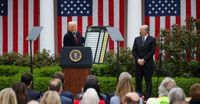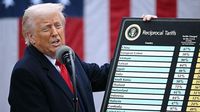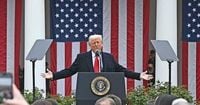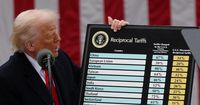On April 2, 2025, President Donald Trump officially declared the day as 'Liberation Day', marking the beginning of a significant trade war that will see the United States impose hefty import tariffs on several countries. The announcement was made in the Rose Garden of the White House, where Trump outlined his administration's strategy of implementing reciprocal tariffs, which means if other nations impose tariffs on American goods, the U.S. will respond in kind.
Starting on April 3, 2025, the auto sector will face a 25 percent import tariff, which will also apply to auto parts including powertrains, engines, and electrical components. Trump emphasized that these tariffs are intended to protect American jobs and industries, claiming that the U.S. has been financially exploited by foreign nations for decades.
During his speech, Trump provided a detailed breakdown of the new tariffs, stating that imports from the European Union will incur a 20 percent tariff, while products from China will face a staggering 34 percent tariff. Additionally, the United Kingdom will see a 10 percent tariff on its imports. Trump stated, "We share the tariffs that are imposed on us by half," referring to his calculations of the tariffs he believes foreign nations charge on American goods.
These new tariffs are part of Trump's broader strategy to renegotiate trade agreements that he believes have been unfavorable to the United States. He argued that countries like China impose tariffs as high as 67 percent on U.S. products, while he plans to cut those rates in half for American goods entering their markets. However, the European Commission has countered Trump's claims, stating that the actual tariffs on U.S. products were around 1 percent in February, not the 39 percent he cited.
Trump's announcement has sparked concerns of a retaliatory trade war. Political analysts predict that countries affected by these tariffs will respond with their own measures, potentially leading to a cycle of escalating tariffs. "Some countries will be angry, yes, because we've never charged them anything," Trump acknowledged during his speech.
In addition to the tariffs on the EU and China, Trump announced that countries like India and Vietnam would face import tariffs of 26 percent and 46 percent respectively, down from claimed rates of 52 percent and 90 percent. The U.S. will also implement a basic tariff of 10 percent on all other countries that do not have specific tariffs imposed upon them.
As the tariffs are set to take effect, the exact timeline remains unclear. Trump stated that the tariffs would start immediately, but sources from CNN indicated that they might not begin until April 9, 2025. This delay could provide countries with tariffs higher than 10 percent an opportunity to negotiate.
Trump's approach has elicited mixed reactions. While he and his administration tout the tariffs as a way to revitalize American manufacturing and reduce trade deficits, critics warn that they could lead to higher prices for consumers and potential job losses in industries reliant on imported goods.
In the aftermath of Trump's announcement, stock markets reacted negatively, with many companies experiencing significant declines in share price. The S&P 500 fell by 2 percent, the Nasdaq by 3.3 percent, and the Dow Jones by 1 percent. Investors are concerned that the tariffs could lead to reduced trade, increased prices, and ultimately, a recession.
As the global trade landscape shifts, the reactions from affected countries will be closely monitored. The European Union has already indicated that it will respond to the U.S. tariffs in a "targeted and proportional" manner, seeking to minimize damage while addressing the new trade barriers.
Trump's administration has positioned these tariffs as necessary for protecting American interests, but the long-term implications remain uncertain. Will the tariffs indeed lead to a resurgence of American manufacturing, or will they trigger a broader economic downturn? As the world watches, the coming days will be crucial in determining the future of international trade relations.
In the context of this trade war, the phrase 'Liberation Day' takes on a complex meaning. For Trump, it symbolizes a break from what he perceives as the exploitation of American workers by foreign nations. However, for many economists and political analysts, it raises questions about the potential fallout and the efficacy of such aggressive trade policies.
As Trump continues to push forward with his agenda, the stakes are high for both the U.S. and its trading partners. The balance between protecting domestic industries and fostering healthy international trade relationships is delicate, and the outcomes of these tariffs could shape economic policies for years to come.







